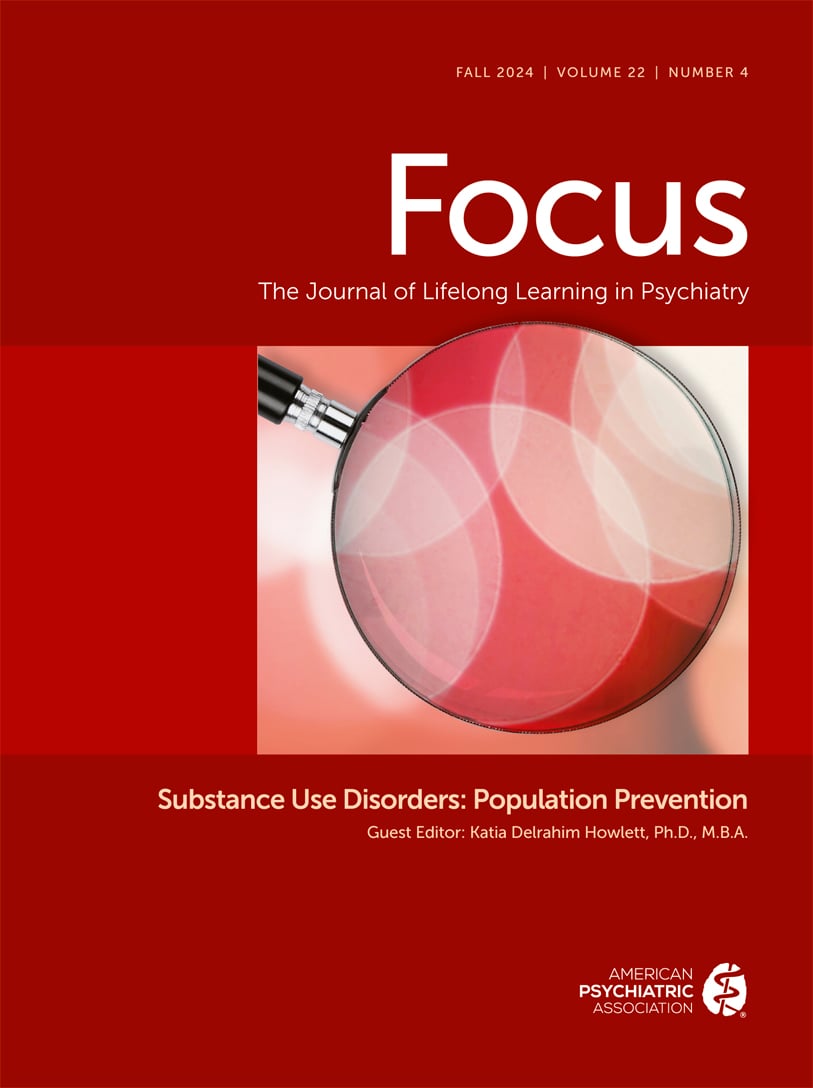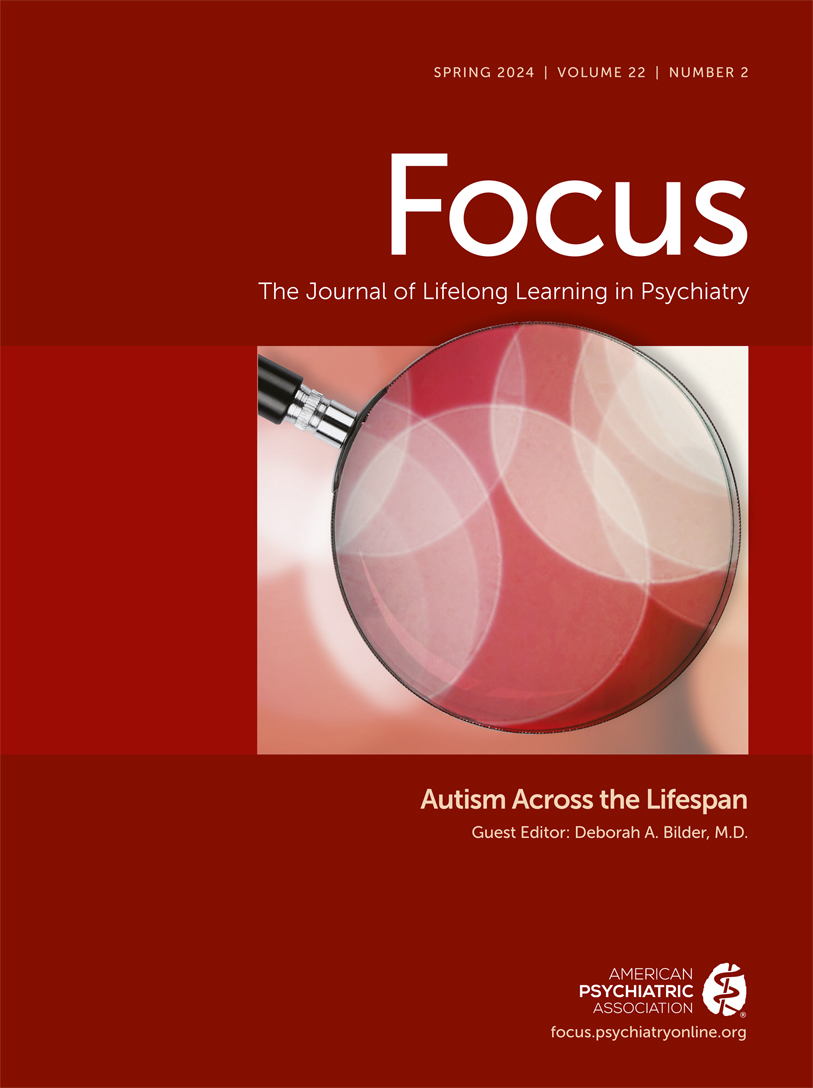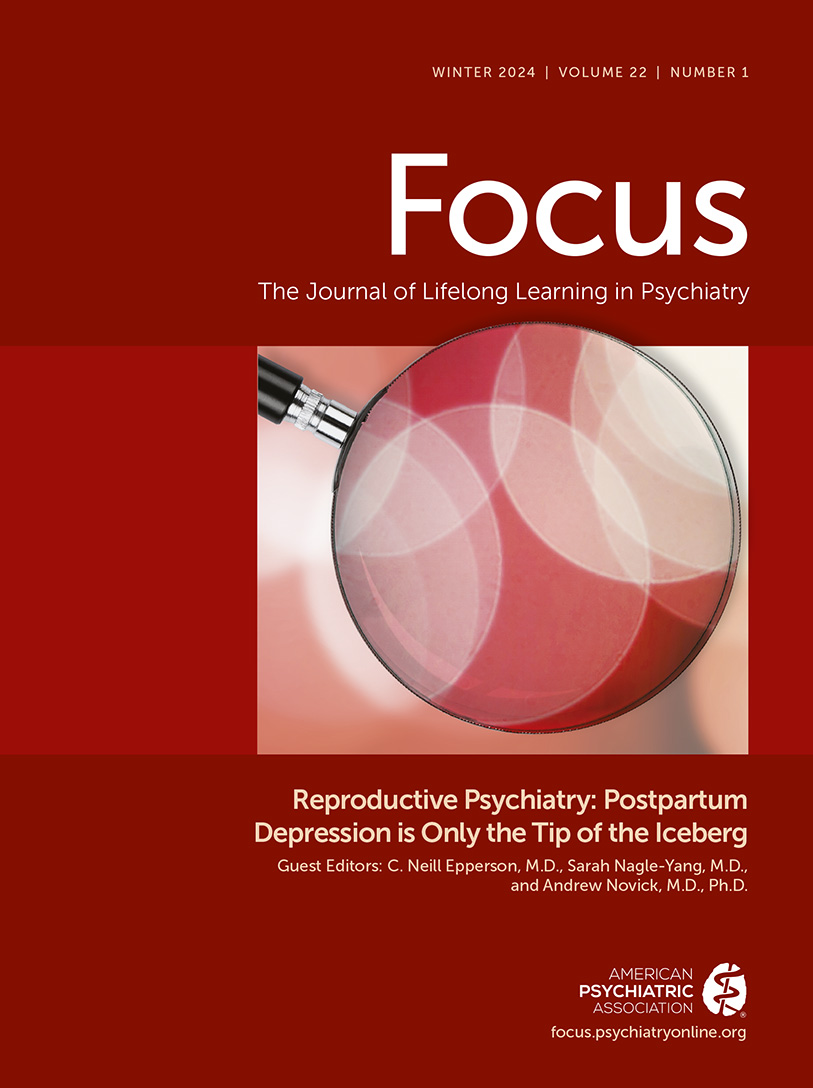Focus
- Volume 14
- Number 4
- October 2016
From the Guest Editor
Reviews
Publication date: 01 October 2016
Pages410–421Mild traumatic brain injury (MTBI) is a significant public health problem worldwide. Injured individuals have an increased relative risk of developing a variety of neuropsychiatric conditions associated with the profile of brain regions typically affected ...
https://doi.org/10.1176/appi.focus.20160025Publication date: 01 October 2016
Pages422–431Psychogenic nonepileptic seizures (PNES) are a subtype of conversion disorder (also called functional neurological symptom disorder in DSM-5). Patients with PNES are high utilizers of health care and can have disability levels similar to those of patients ...
https://doi.org/10.1176/appi.focus.20160020Publication date: 01 October 2016
Pages432–436Antibodies to brain cell-surface proteins have recently been identified in patients whose symptoms cross the boundary between neurology and psychiatry and are associated with syndromes that are responsive to treatment with immunosuppression-based ...
https://doi.org/10.1176/appi.focus.20160019Clinical Synthesis
Publication date: 01 October 2016
Pages437–447Cognitive impairment is ubiquitous in medicine and a common experience in everyday life. When severe, persistent, or progressive, it becomes a matter of clinical concern. Top causes of clinically significant cognitive impairment are neurodegenerative ...
https://doi.org/10.1176/appi.focus.20160026Publication date: 01 October 2016
Pages448–464The term frontotemporal dementia (FTD) describes a diverse group of clinical syndromes, including behavioral-variant FTD (bvFTD), nonfluent/agrammatic-variant primary progressive aphasia (nfvPPA), semantic-variant primary progressive aphasia (svPPA), FTD ...
https://doi.org/10.1176/appi.focus.20160018Publication date: 01 October 2016
Pages465–472Mood disorders associated with epilepsy are very common and overrepresented compared with other chronic medical conditions. Depression is a particularly common and worrisome comorbidity, especially because suicidality seems to be increased significantly ...
https://doi.org/10.1176/appi.focus.20160017Ask the Expert
Ethics Commentary
Communication Commentary
Patient Management Exercise
Bibliography
Abstracts
Influential Publications
Publication date: 01 October 2016
Pages492–498Worldwide prevalence of dementia is predicted to double every 20 years. The most common cause in individuals over 65 is Alzheimer’s disease (AD), but in those under 65, frontotemporal dementia (FTD) is as frequent. The physical and cognitive decline that ...
https://doi.org/10.1176/appi.focus.140406Publication date: 01 October 2016
Pages499–509Adaptive behavior requires neural systems that mediate the evaluation of stimuli in terms of the well-being of the organism and generate subsequent goal-directed behavior. The authors provide an overview of these systems, with an emphasis on those related ...
https://doi.org/10.1176/appi.focus.140401Publication date: 01 October 2016
Pages510–515Anti-N-methyl-d-aspartate receptor (NMDAR) encephalitis is a recently-discovered synaptic autoimmune disorder in which auto-antibodies target NMDARs in the brain, leading to their removal from the synapse. Patients manifest with prominent psychiatric ...
https://doi.org/10.1176/appi.focus.140405Publication date: 01 October 2016
Pages516–522The aim of this study was to investigate the neuropsychological correlates of behavioral and psychological symptoms (BPSD) in patients affected by various forms of dementia, namely Alzheimer’s disease (AD), frontal-variant frontotemporal dementia (fvFTD), ...
https://doi.org/10.1176/appi.focus.140407Publication date: 01 October 2016
Pages523–532This review presents data showing that apathy is common across a number of disorders. Apathy is not only common, but is also associated with significant problems: reduced functional level, decreased response to treatment, poor illness outcome, caregiver ...
https://doi.org/10.1176/appi.focus.140402Departments
Past Issues
View Issues Archive
Vol. 22 | No. 4

Vol. 22 | No. 3

Vol. 22 | No. 2
